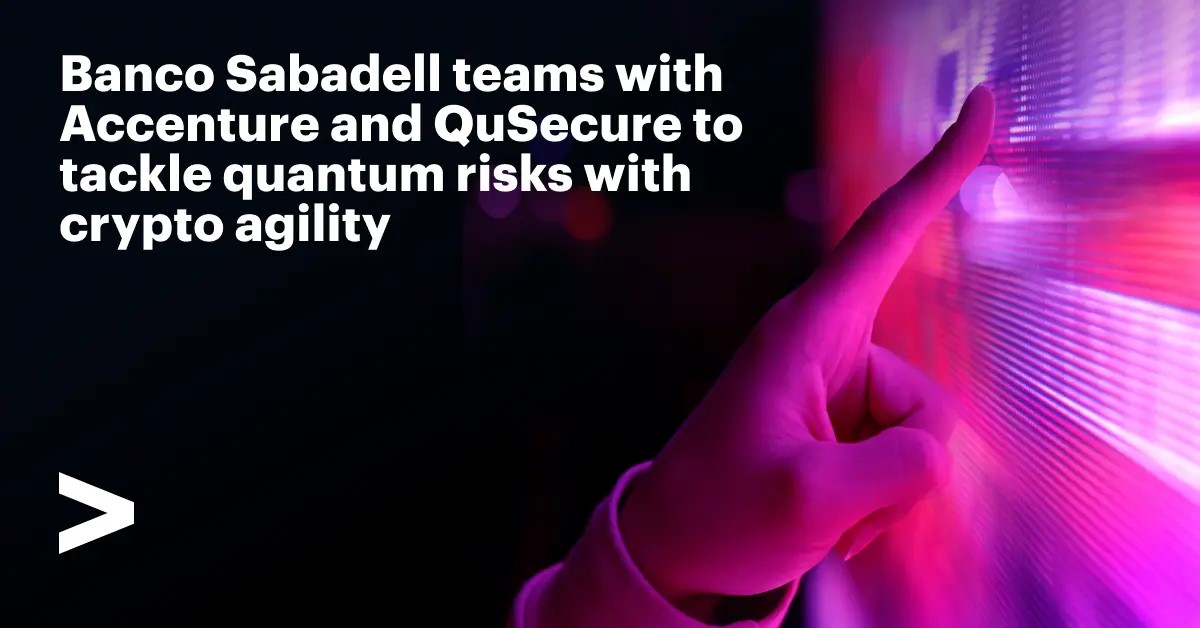Insider Brief:
- Banco Sabadell successfully completed a four-month pilot project with Accenture and QuSecure to integrate post-quantum cryptography technologies into its infrastructure in order to safegaurd financial data against potential quantum threats.
- The project used QuSecure’s software for encryption agility and open-source libraries, modernizing the bank’s cryptographic systems without requiring major infrastructure changes.
- Accenture provided Banco Sabadell with a detailed roadmap for transitioning to quantum-resilient encryption, leveraging expertise from its quantum security test labs to address the vulnerabilities of traditional cryptographic methods.
- This collaboration may serve as a benchmark for financial institutions, demonstrating how quantum-safe technologies can be implemented efficiently in complex environments.
PRESS RELEASE — In a recent release, Accenture announced that Banco Sabadell has successfully concluded a four-month pilot project with Accenture and QuSecure to integrate post-quantum cryptography technologies into its infrastructure. According to the announcement, the initiative highlights the bank’s commitment to safeguarding critical financial data against future quantum threats.
The project incorporated QuSecure’s software for encryption agility alongside open-source libraries, helping Banco Sabadell modernize its cryptographic systems. “This project…has allowed us to explore the impact of the adoption of post-quantum cryptography technologies on the bank’s infrastructure,” said Joan Puig, Group CISO of Banco Sabadell, emphasizing the role cryptography plays in banking operations, from securing payments to protecting sensitive customer information.
Addressing the Cryptographic Elephant in the Room
Quantum computing is considered to be a notable threat to modern cryptography. Many widely used cryptographic algorithms, such as RSA and ECC, could potentially be broken by quantum computers, exposing sensitive data to unprecedented risks. The transition to quantum-safe cryptography involves implementing new quantum-resistant algorithms, such as those recently standardized by the National Institute of Standards and Technology.

According to the Financial Services Information Sharing and Analysis Center, transitioning to crypto agility—an organization’s ability to adapt to evolving cryptographic standards—is a necessary, long-term endeavor that requires immediate action. This project demonstrates how organizations might proactively address these challenges.
Accenture, with its expertise in quantum security test labs, provided Banco Sabadell with a detailed roadmap to transition to quantum-resilient encryption. “This collaboration underscores our commitment to helping organizations safeguard their data from emerging threats posed by the rapid quantum computing advancements,” said Tom Patterson, emerging technology security lead at Accenture.
Innovating with Quantum-Safe Encryption Solutions
According to the release, one of the project’s main innovations was the deployment of QuSecure’s network-layer encryption, which enables organizations to implement quantum-safe standards without overhauling existing infrastructure. “This is the fastest and easiest way to protect enterprises without having to rip and replace existing infrastructure,” said Elizabeth Green, SVP of Customers and Ecosystems at QuSecure.
The collaboration also exemplified how the deprecation of major algorithms—anticipated by NIST in the coming years—can be mitigated in a timely and efficient manner. By modernizing its encryption systems now, Banco Sabadell has positioned itself as on of the first movers to adopt quantum-safe technologies within the financial sector.
Setting the Standard for Quantum Resilience in Financial Services
As financial institutions prepare for the outcome of quick-paced quantum technology development, this project may be considered a case study for similar organizations interested in addressing their cryptographic resilience. The collaboration provided Banco Sabadell with a comprehensive understanding of how quantum security technologies can be integrated, setting a benchmark for proactive and agile security strategies in the financial industry.
The successful completion of this project not only solidifies Banco Sabadell’s infrastructure but also demonstrates the ability of transitioning to PQC within complex environments. As Joan Puig noted, addressing the vulnerabilities of existing cryptographic methods and transitioning to quantum-safe cryptography with efficiency is essential for ensuring the integrity of banking operations in the post-quantum era.
As Elizabeth Green remarked, “Mitigation of existing encryption to Post Quantum Standards…is possible and can be achieved expediently this decade.” For financial institutions like Banco Sabadell, the journey toward quantum resilience has begun in earnest.













